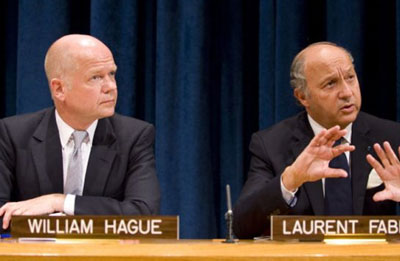
EU sanctions to hit Iran banking, energy sector
Brussels, September 26, 2012
European governments are considering a new round of sanctions against Iran over its nuclear programme that could be implemented in October and substantially curtail trade with the Islamic Republic and hit its banking industry, diplomats say.
The push comes at a time when tensions between Iran and Israel are rising, threatening to engulf the Middle East in a new war, and diplomatic efforts to resolve the decade-long dispute over Iran's nuclear work have foundered.
In response, governments in Europe and the US are making a new push to persuade Tehran to scale back the enrichment of uranium, believed to be part of Tehran's programme to build a nuclear bomb. Iran denies any military intentions and says it seeks to increase energy supplies with nuclear power.
Foreign ministers of France, Germany and Britain asked their EU counterparts to agree on new measures by their next policy meeting on October 15, in a joint letter sent in recent days.
"We must let Iran know that we have not exhausted our options," Laurent Fabius, Guido Westerwelle and William Hague wrote in the letter, a copy of which was seen by Reuters.
The three ministers listed energy, finance, trade and transportation as the sectors to target.
European diplomats said several proposals for specific measures have circulated in Brussels in recent days, including moves to close loopholes in sanctions against the Iranian central bank agreed this year. No decisions have yet been taken.
More commercial banks could also be added to the lists of companies targeted by EU asset freezes, several diplomats said, without identifying any institutions. Sanctions imposed by Washington target roughly a dozen more banks than EU measures, which could be expanded to add these.
A number of shipping companies are also being considered as new sanction targets, diplomats said.
It was not clear if the European Union would target Iran's state-owned National Iranian Oil Company, one of the world's largest oil exporters, which the US government officially linked to Tehran's Islamic Revolutionary Guard Corps on Monday.
European governments have already taken major steps to put pressure on Iran, such as an oil embargo, to get it to comply with international demands that it abandon enrichment of uranium, believed to be part of programme to build nuclear weapons.
But experts say the current sanctions leave plenty of leeway for Iranian firms to operate in Europe, partly because European sanctions tend to pick specific targets rather than impose sweeping bans.
Transactions with the Iranian central bank, which settles most trade payments, are allowed if they are linked to legitimate trade, for example.
Targeting specific companies accused of financing Tehran's nuclear proliferation activities also means that firms can evade sanctions by spinning off new ones.
Britain is pushing for a ban on trade with Iran in any energy-related sector, which could help close such loopholes.
"The Iranians spin out new companies and the Europeans play catch-up. It would be more effective to have a blanket ban," said Mark Dubowitz, head of the non-profit Foundation for Defense of Democracies in the US, which pushes for tough sanctions on Iran.
Diplomats said talks between the EU's 27 members are at a preliminary stage, meaning new proposals are expected. But discussions will likely be heated, with many capitals concerned about the impact of any new sanctions on economies battered by a three-year debt crisis.
"The debate should intensify in the coming week," one EU diplomat said. "There are various suggestions and nothing has been agreed."-Reuters







